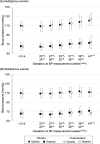The effect of pregnancy vitamin D supplementation on maternal blood pressure: real-world data analysis within the MAVIDOS randomised placebo-controlled trial
- PMID: 39880969
- PMCID: PMC11985589
- DOI: 10.1007/s00404-025-07958-z
The effect of pregnancy vitamin D supplementation on maternal blood pressure: real-world data analysis within the MAVIDOS randomised placebo-controlled trial
Abstract
Purpose: Observational studies have suggested negative associations between maternal 25-hydroxyvitamin D (25(OH)D) status and risk of hypertensive disorders of pregnancy [pregnancy-induced hypertension (PIH) and preeclampsia (PET)]. Data from intervention studies are limited. We hypothesised that vitamin D supplementation would lower maternal blood pressure (BP) during pregnancy and reduce the incidence of hypertensive disorders of pregnancy.
Methods: The Maternal Vitamin D Osteoporosis Study (MAVIDOS) was a randomised placebo-controlled trial. Pregnant women with a baseline 25(OH)D of 25-100 nmol/l were randomized to either 1000 IU/day cholecalciferol or placebo from 14 to 17 weeks' gestation until delivery. BP recordings documented during routine clinical pregnancy care were obtained from clinical records and grouped into gestational windows based on the schedule for routine antenatal care in the United Kingdom (23+0-24+6, 27+0-28+6, 33+0-35+6, 37+0-38+6, 39+0-40+6 and ≥ 41+0 weeks+days). Systolic and diastolic BP measurements in these gestational windows were compared between randomisation groups. Diagnoses of PIH or PET (in accordance with national guidelines) and the use of antihypertensive agents were also noted and compared between groups.
Results: Data for 734 women (366 cholecalciferol, 368 placebo) were included. Maternal mean systolic and diastolic BP did not differ between the randomization groups at any of the gestations studied. The incidences of PIH (placebo 1.6%, cholecalciferol 3.6%, p = 0.10) and PET (placebo 3.3%, cholecalciferol 3.8%, p = 0.68) were similar between the two groups.
Conclusions: Gestational vitamin D supplementation with 1000 IU/day from 14 to 17 weeks gestation did not lower maternal BP or reduce the incidences of PIH or PET in this trial.
Keywords: Cholecalciferol; Hypertensive disorders of pregnancy; Preeclampsia; Pregnancy-induced hypertension.
© 2025. The Author(s).
Conflict of interest statement
Declarations. Conflict of interest: KMG has received reimbursement for speaking at conferences sponsored by companies selling nutritional products and is part of an academic consortium that has received research funding from Bayer, Nestec, BenevolentAI Bio Ltd. and Danone, outside the submitted work. CC reports personal fees from ABBH, Amgen, Eli Lilly, GSK, Medtronic, Merck, Novartis, Pfizer, Roche, Servier and Takeda, outside the submitted work. NCH reports personal fees, consultancy, lecture fees and honoraria from Alliance for Better Bone Health, AMGEN, MSD, Eli Lilly, Servier, Theramex, Shire, Consilient Healthcare, Kyowa Kirin and Internis Pharma, outside the submitted work. RJM has received travel bursaries from Kyowa Kirin unrelated to this work. NLC-C, SRC and SD declare no conflicts of interest related to the submitted work. Ethical approval: The original MAVIDOS trial, from which this data analysis was performed on, was conducted in accordance with the Declaration of Helsinki guidelines and was approved by the Southampton and South-West Hampshire Research Ethics Committee and full approval from UK Medicines and Healthcare products Regulatory Agency (MHRA) was granted. All women gave written informed consent to participate in the pregnancy phase of the study. MAVIDOS was registered on the International Standard Randomised Controlled Trial registry, ISRCTN 82927713, and the European Clinical Trials Database, EudraCT 2007–001716–23 [18].
Figures
References
Publication types
MeSH terms
Substances
Grants and funding
LinkOut - more resources
Full Text Sources
Medical



